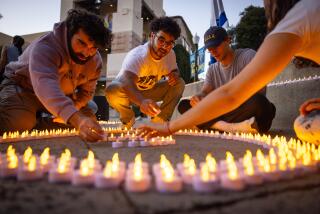BELIEFS
- Share via
Rabbi Ted Riter of Temple Adat Elohim in Thousand Oaks told throngs of demonstrators Sunday that it was important to rally against the deadly violence in Sudan because one day the marchers’ grandchildren will ask: Where were you?
“We . . . made a promise to our ancestors to never forget,” Riter said, referring to a commitment by fellow Jews not to let atrocities such as the Holocaust go unchallenged.
The crowd gathered as part of the third annual Walk for Darfur, a roughly three-mile march and educational fair sponsored by Southern California-based Jewish World Watch. It was held at Pierce College Farm Center in the western San Fernando Valley and drew about 2,000 people, most of whom came from Los Angeles-area synagogues.
Many marchers carried signs that read “Stop Killing in Darfur,” “Save Darfur,” and “Never Again: Now.” Others hung orange postcards around their necks with information about a refugee on one side and a message on the other urging President Obama to lead an international peace effort.
Organizers said they raised more than $100,000 from participants. The money will be used to help the organization’s work in refugee camps for victims of the conflict and for domestic education about the violence, among other projects.
Janice Kamenir-Reznik, president of Jewish World Watch, said that many Jews felt as though much of the world abandoned them during the Holocaust. As a result, she said, Jews and others cannot watch violence unfold against other groups without raising their voices.
“We are a piece of the world,” said Kamenir-Reznik, whose organization started about five years ago and now includes a network of about 60 synagogues in the greater Los Angeles area. She said that Judaism was founded on stories of liberation and that Jews are “not just supposed to be passive observers of the world.”
The Darfur region of western Sudan is about the size of France, with an estimated population of about 6 million. Fighting broke out in 2003 when ethnic African groups alleging discrimination rebelled against the Arab-dominated central government. In response, pro-government Arab militias, known as janjaweed, have been accused of committing widespread atrocities, many of them against civilians.
Estimates of the dead vary. The International Criminal Court says that 135,000 people have died from hunger, disease and fighting. The United Nations places the number of dead at about 300,000 and the number of refugees at 2.7 million. Jewish World Watch says 400,000 people have been killed.
About a dozen Sudanese who are living in Phoenix joined Sunday’s march. Before the walk began, an organizer huddled with two of the visitors to correct English-Arabic translations of phrases such as “Stay strong,” “We are here for you,” and “The killers will be brought to justice soon.”
The Sudanese group led the walk and chanted slogans such as “Stop genocide in Darfur” and “Bashir to ICC,” referring to the arrest warrant issued by the International Criminal Court for Lt. Gen. Omar Hassan Ahmed Bashir, president of Sudan.
Faisal Abdelmoula, 37, said he was studying English at a university when he fled Darfur for Cairo in 2001. He said that he had been arrested and tortured, and that government officials accused him of belonging to rebel groups. He said he met Jewish people for the first time in Cairo while working at a restaurant that served tourists. He came to the United States in 2004.
Abdelmoula, who is Muslim, said he has participated in the walk in previous years and was not surprised when he learned that a Jewish group was organizing the event.
“You never find people that support issues in Darfur like Jews,” Abdelmoula said. “The same thing happened . . . They went through a lot of crises in their lives. We are going through crisis now.”
Tony Reed, 45, of West Hills came to the walk with his family and other members of Congregation Or Ami in Calabasas. He said they knew Sunday’s actions would not immediately put a stop to the violence but they were “doing our very, very small part to make the world more aware.”
Reed said it is important to have people of different faiths and ethnicities supporting each other’s causes because “it’s very easy to say, ‘it’s not happening to me.’ ”
After Sunday’s walk, Riter, the Thousand Oaks rabbi, held up one of the beige T-shirts that had been handed out. The words “End Genocide Now” were printed above a map with the locations of other mass killings in Rwanda, Armenia, Bosnia, Cambodia and Germany.
“You think we’d learn the lesson, and we haven’t,” he said. “We don’t want our kids to have to walk.”
--
More to Read
Sign up for Essential California
The most important California stories and recommendations in your inbox every morning.
You may occasionally receive promotional content from the Los Angeles Times.










